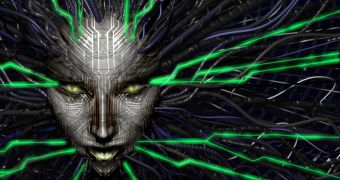Among the most memorable aspects in many videogames are the villains that the player must defeat in his/her quest. And among the most interesting subcategories of villains are the computer-based ones that fascinate by being inhuman while striving for humanity, for being a clear representation of “otherness” while reflecting something about our own ideas and attitudes.
Recently, 1up ran a feature, which declared GLaDOS aka Genetic Lifeform and Disk Operating System, of Portal fame, to be the most insane videogame computer while only giving the number four spot to SHODAN aka Sentient Hyper-Optimized Data Access Network, which starred in the System Shock series. I would like to object to this choice and argue than SHODAN is clearly the craziest computer in this match up.
GLaDOS is a lightweight. She’s gotten a bunch of rooms under her control, probably killed some subjects and appears to the player alluring and dangerous at the same time, until the final confrontation when she reveals her evil. She also sings in a creepy way, lies with each word and shrouds all which could be considered fact about herself in a layer of half truths and misdirection. Her presence hovers in the Aperture Science and even if destroyed, she is probably still alive.
SHODAN does all that and more. She's female, alluring, dangerous, and incredibly powerful as she controls a huge orbital station in the first System Shock and two ships and an alien brood in the second game. She's always watching the player, impersonating a variety of people, going from love for the player to hate in the blink of an eye and working towards goals like the ultimate destruction of all humanity and the reworking of the very fabric of reality.
When talking about insane characters and especially insane computers, scale matters. Can we really compare the small scale test like ambitions of GLaDOS with the way SHODAN plans to reconstruct the universe? No. Scale is everything. SHODAN must be the most insane computer in the history of videogaming, although AM could give her a run for her money if it did not have its origins firmly established in the literary genre rather than in the videogame one.

 14 DAY TRIAL //
14 DAY TRIAL //